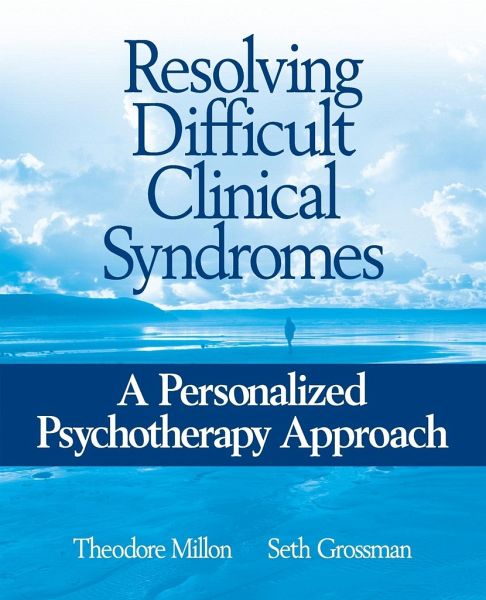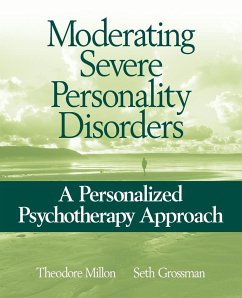
Resolving Difficult Clinical Syndromes
A Personalized Psychotherapy Approach

PAYBACK Punkte
31 °P sammeln!
This volume provides clinicians with a unique combination of conceptual background and step-by-step practical advice to guide their treatment of the clinical disorders listed under Axis I of the DSM-IV-TR: Substance Abuse, Schizophrenia, Mood, and Anxiety Disorders. Unique in its inclusion of the patient's personality in the treatment plan, Personality-Guided Procedures for Treating Difficult Clinical Cases includes both eclectic and client-centered approaches to psychotherapy.
A revolutionary, personalized psychotherapy approach for the treatment of Axis I clinical disorders, by renowned expert Dr. Theodore Millon
Acknowledging the primacy of the whole person, Resolving Difficult Clinical Syndromes: A Personalized Psychotherapy Approach takes into account all of the complexities of human nature--family influences, culture, neurobiological processes, unconscious memories, and so on--illustrating that no part of human nature should lie outside the scope of a clinician's regard.
Part of a three-book series, Resolving Difficult Clinical Syndromes: A Personalized Psychotherapy Approach provides you with a unique combination of conceptual background and step-by-step practical advice to guide your treatment of Axis I clinical disorders.
Detailed case studies are provided throughout the text to illustrate the strategies of personalized psychotherapy for:
_
Mood-Related Syndromes: Dysthymic, Major Depressive, and Bipolar Disorders
_
Acute, Post-Traumatic, and Generalized Anxiety Syndromes
_
Anxiety-Related Psychological Syndromes: Phobic, Dissociative, and Obsessive-Compulsive Disorders
_
Anxiety-Related Physical Syndromes: Somatoform and Conversion Disorders
_
Cognitive Dysfunction Syndromes: Substance-Related and Schizophrenia-Spectrum Disorders
Destined to become an essential reference for trainees and professionals, this book makes a revolutionary call to return therapy to the natural reality of each patient's life, seamlessly guiding you in understanding the personality and treatment of the whole, unique, yet complex person who exhibits a notable clinical syndrome.
Acknowledging the primacy of the whole person, Resolving Difficult Clinical Syndromes: A Personalized Psychotherapy Approach takes into account all of the complexities of human nature--family influences, culture, neurobiological processes, unconscious memories, and so on--illustrating that no part of human nature should lie outside the scope of a clinician's regard.
Part of a three-book series, Resolving Difficult Clinical Syndromes: A Personalized Psychotherapy Approach provides you with a unique combination of conceptual background and step-by-step practical advice to guide your treatment of Axis I clinical disorders.
Detailed case studies are provided throughout the text to illustrate the strategies of personalized psychotherapy for:
_
Mood-Related Syndromes: Dysthymic, Major Depressive, and Bipolar Disorders
_
Acute, Post-Traumatic, and Generalized Anxiety Syndromes
_
Anxiety-Related Psychological Syndromes: Phobic, Dissociative, and Obsessive-Compulsive Disorders
_
Anxiety-Related Physical Syndromes: Somatoform and Conversion Disorders
_
Cognitive Dysfunction Syndromes: Substance-Related and Schizophrenia-Spectrum Disorders
Destined to become an essential reference for trainees and professionals, this book makes a revolutionary call to return therapy to the natural reality of each patient's life, seamlessly guiding you in understanding the personality and treatment of the whole, unique, yet complex person who exhibits a notable clinical syndrome.












